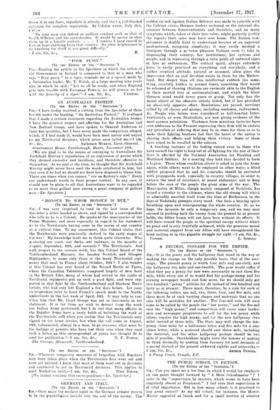GERMANY AND ITALY. (To Ton ElitTOR or THE " SPECTATOR.")
Eta,—Once more the weakest point in the German armour proves to be the psyeliological insight iota the soul of the enemy. The sudden onrush against Italian defences was made to coincide wills the Cabinet crisis; German lenders reckoned on the internal dis- sensions between Interventionists and Socialists, and on many symptoms which, taken at their face value, might perfectly justify the reports their spies may have sent home. The Italian tem- perament is doubly hard to understand because of an apparent good-natured, easygoing simplicity; it may easily mislead a foreigner through a perverse pleasure Italians seem to take in disparaging their country, her institutions, her systems and people, and in repressing through a false pride all outward signs of love or enthusiasm. The critical spirit, always extremely keen, is easily practised on everything and everybody, and a rather sceptical attitude, natural or assumed, often gives the impression that no real devotion exists in them for the Mother. land. But deeper than all this intellectual rubbish lies some- thing, carefully hidden in normal times, something they would be ashamed of showing (Italians are curiously akin to the English in their morbid fear of sentimentalism), and which the blunt German mind would never guess or grasp. Not only has the moral object of the offensive utterly failed, but it has provoked an absolutely opposite effect. Resolutions are passed, meetings called by all classes and groups, including workmen, railwaymen, Sc. People who before were considered as half-hearted Inter- ventionists, or even Neutralists, are now giving evidence of the most earnest patriotism. Workmen from munition factories have sent addresses to the Premier expressing their firm will to sustain any privation or suffering that may be in store for them so ns to make their fighting brothers feel that the heart of the nation is sharing their efforts and helping their victory. Some of them have asked to be recalled to the colours.
A touching instance of the feeling roused even in those who have earned the right to keep out of all fighting for the rest of their lives is afforded by the National Association for Disabled and Mutilated Soldiers. At a meeting they held they decided to form a Legion. Those whose condition allows it asked to join the Army again, while others want to be employed in other ways; a blind soldier proposed that he and his comrades should be entrusted with propaganda work, especially in country villages, in order to enforce the need of resistance, of moral endurance, and to keep before the eyes of the people the gl.cat aims of the war. The Municipality of Milan, though mainly composed of Socialists, hoe iesued is circular to the citizens, where the old strong will which so admirably asserted itself from the time of Barbarossa to the days of Radetssky prompts every word. One feels a bracing spirit breathing upon and reinvigorating the whole country. If, as we hope, the invasion be only a temporary one, and we may soon succeed in pushing back the enemy from the ground he at present holds, the bitter lesson will not have been without its effects. It will have roused the people to the spiritual energy without which no great end is ever fruitfully achieved, while the generous moral and material support from our Allies will have strengthened the bond uniting us in this gigantic struggle for right.—I am, Sir, Sc..














































 Previous page
Previous page